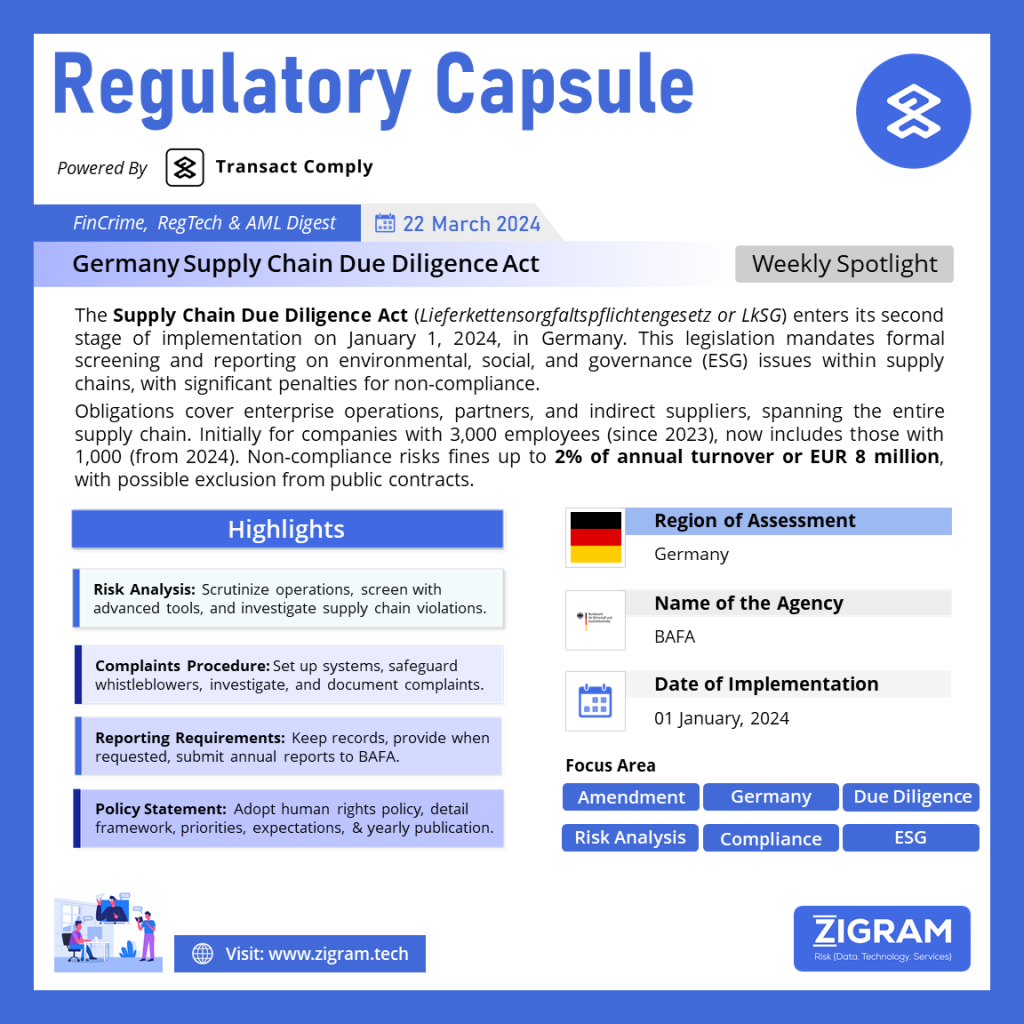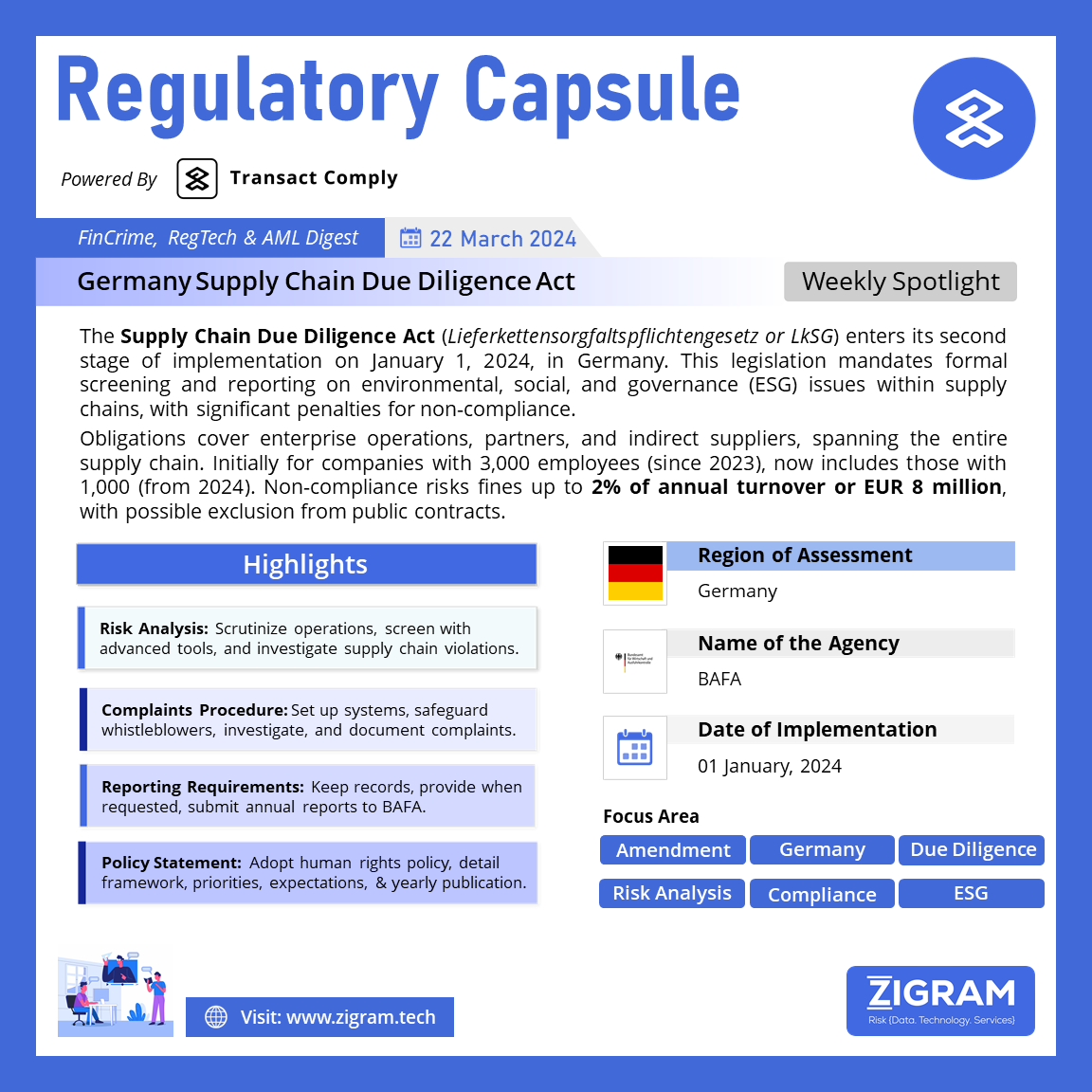Published Date:
Regulation Name: Germany Supply Chain Due Diligence Act
Implementation Date: 01 January 2024
Region: Germany
Agency: Federal Office of Economics and Export Control (BAFA)
The Supply Chain Due Diligence Act (LkSG) enters its second stage of implementation on January 1, 2024, in Germany. This legislation mandates formal screening and reporting on environmental, social, and governance (ESG) issues within supply chains, with significant penalties for non-compliance. It extends organizations’ duty of care beyond their operations to cover their supply chains. Compliance is overseen by the German Federal Office for Economic Affairs and Export Control (BAFA). This Act underscores the importance of ESG issues, making them unavoidable considerations for corporations in their operations.
Scope and Impact:
– The Act applies to companies with a workforce of 1,000+ globally.
– It affects all industries and demands compliance on all levels of the supply chain.
Due Diligence Obligations:
To align with the Supply Chain Act, companies should assess existing due diligence policies against their ESG standards, adjusting screening processes and policies accordingly. Key steps include:
1. Risk Analysis: Scrutinize own operations for human rights or environmental vulnerabilities, remedying any issues and documenting actions for the compliance report. Employ advanced screening software for ongoing monitoring, especially for direct suppliers facing heightened risk. Investigate indirect suppliers upon credible knowledge of potential violations.
2. Complaints Procedure: Establish a system for reporting human rights abuses internally and externally, ensuring protection for whistleblowers. Make the complaints system publicly available, promptly investigate reports, and document procedures, in line with BAFA standards.
3. Reporting Requirements: Maintain documentation of due diligence efforts for seven years, producing it upon request. Prepare annual reports on preventive and remedial measures taken, submitting them to BAFA.
4. Policy Statement: Adopt a human rights policy statement outlining the risk management framework, analysis procedures, preventive measures, and complaints procedures. Detail priorities regarding human rights and the environment, along with expectations for employees and suppliers, and publicize it annually.
It holds manufacturers responsible for violations from raw material extraction to product use. While targeting direct suppliers, companies must address potential violations reported by indirect suppliers. Financial institutions can also be held accountable for violations in the supply chains of entities they finance.
Engagement with Third Parties:
– Tools like the Integrity Platform facilitate tracking relationships and risk monitoring.
– Real-time monitoring and due diligence are vital.
Penalties for Violations:
– Monetary fines of up to EUR 8,000,000 or up to 2 % of global annual turnover and exclusion from public tenders for violators.
– Reputational risks are associated with non-compliance.
Impact of the German Supply Chain Act:
– The Supply Chain Act expands coverage to more companies by 2024, increasing mandates on human rights issues.
– Companies face liability and risks for non-compliance but can mitigate risks by investing in risk management and compliance.
In conclusion, the Supply Chain Due Diligence Act represents a significant milestone in corporate responsibility, compelling companies to prioritize human rights and environmental protections throughout their supply chains. By imposing stringent due diligence obligations, including risk analysis, complaints procedures, reporting requirements, and policy statements, the Act fosters transparency, accountability, and ethical business practices. With escalating penalties for non-compliance and a broadening scope of coverage, the Act signals a fundamental shift towards sustainability and social justice in global commerce. As companies adapt to meet these obligations, they not only mitigate risks but also contribute to a more equitable and sustainable future for all stakeholders involved in the intricate web of modern supply chains.
- #Supply_Chain
- #Due_Diligence
- Germany
- #Compliance
- #Risk_Analysis


